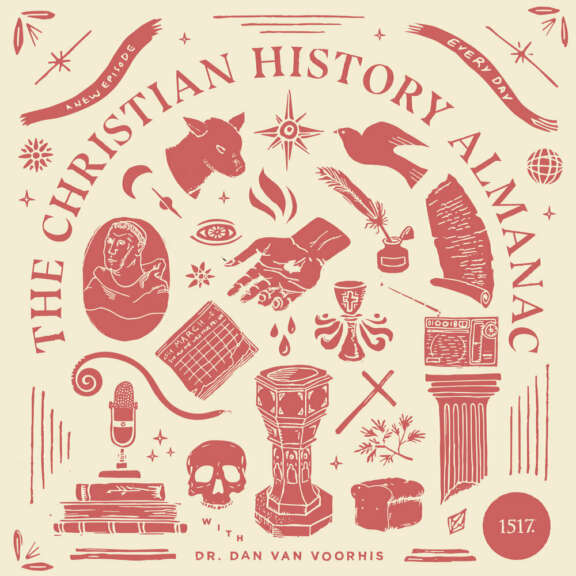The year was 1543. We remember Johann Eck, the "dreck." The reading for today is "New Prince, New Pomp" by the Early modern poet Robert Southwell.
Podcasts
Each 1517 Podcast is dedicated to delivering Christ-centered content through weekly, monthly, and seasonal audio platforms. Listen online or on your favorite podcasting app.
Author
- All Authors
- Aaron Zimmerman
- Adam Francisco
- Amy Mantravadi
- Blake Flattley
- Bob Hiller
- Bradley Gray
- Brian W. Thomas
- Bror Erickson
- Bruce Hillman
- Caleb Keith
- Chad Bird
- Chris Rosebrough
- Christopher Gillespie
- Cindy Koch
- Craig Donofrio
- Dan van Voorhis
- Daniel Deen
- Daniel Emery Price
- Darrin Sheek
- David Andersen
- David Rufner
- David Zahl
- Debi Winrich
- Delwyn Campbell
- Donavon Riley
- Doug Klembara
- Edward Killian
- Elyse Fitzpatrick
- Erick Sorensen
- Flame
- Grant Klembara
- Gretchen Ronnevik
- Haroldo Camacho
- Jacob Smith
- Jared C. Wilson
- Jeff Mallinson
- Jeffrey Pulse
- Jessica Thompson
- Jim Nestingen
- Joel Fitzpatrick
- Joel Hess
- John Andrew Schreiner
- John Bombaro
- John T. Pless
- John W. Hoyum
- John Warwick Montgomery
- Katie Koplin
- Kelsi Klembara
- Ken Sundet Jones
- Magnus Persson
- Matt Popovits
- Michael Berg
- Michael Horton
- Nick Lannon
- Paul Koch
- Peter Nafzger
- Philip Bartelt
- Raleigh Sadler
- RJ Grunewald
- Robert Kolb
- Rod Rosenbladt
- Ron Hodel
- Sam Leanza Ortiz
- Sarah Condon
- Sarah Crowder
- Scott Davis
- Scott Keith
- Steven Paulson
- Tanner Olson
- Troy Neujahr
- Uwe Siemon-Netto
- Wade Johnston
- William Cwirla
-
The year was 1849. We remember the creation of Vatican City as an independent city-state in 1929. The last word for today comes from the "Third inkling" Charles Williams.
-
The year was 1587. We remember Mary Stuart, Mary Queen of Scots. The reading for today comes from English poet Robert Herrick, "His Prayer for Absolution."
-
The year was 1878. Today, we rank the top four popes of all time. The reading is from Martin Luther, "On the Freedom of the Christian."
-
Gag me with a spoon. In this episode, part two of Alexander Solzhenitsyn’s essay, “Live Not by The Lies.” We consider herd mentality, our fear of standing up to unjust authority, and the secular indoctrination that infects the church.
-
The year was 679. We remember St. Amand, the Frankish Missionary bishop of Neustria. The reading for today comes from Angelico Chavez, "Jesus at the Well."
-
The year was 1851. We remember John Pye-Smith, the theologian, headmaster, and geologist. The last word for today comes from Sarah Maitland, from her "A Joyful Theology."
-
Lies Taste Like Wonder-bread. In this episode, part one of Alexander Solzhenitsyn’s essay, “Live Not by The Lies.” We discuss the two kingdoms, the need for Christ alone with no additives, and the importance of having an ethos.
-
The year was 856. We remember Rabanus Maurus, a Benedictine monk. Our reading is a hymn from Maurus, "Come, Holy Ghost, our souls inspire."
-
The year was 1788. The Reverend Richard Johnson preached the first Christian sermon in Australia, under a tree in the Sydney cove. The reading is from John Newton, "Father Forgive Them."
-
The year was 1864. Today, we will remember Adelaide Anne Procter, one of the most famous Victorian poets who was a devout Catholic and advocate for the poor and distressed. The reading is from Procter, "The Shadows of the Evening Hours."
-
The year was 1945. We remember the historian of the Middle Ages, Johann Huizinga. The last word for today comes from another Dutchman, Herman Bavinck.

